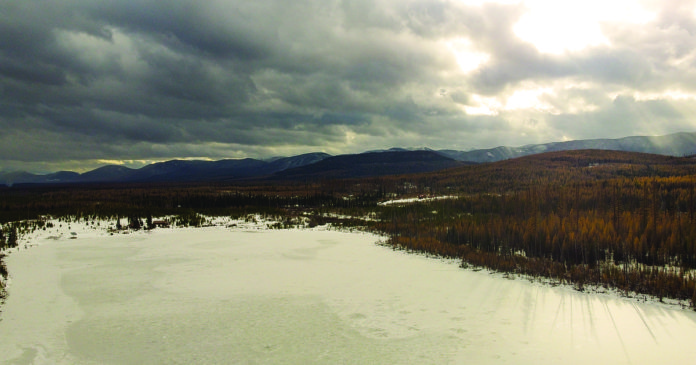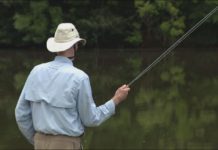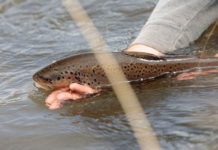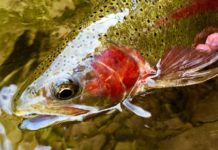The Montana Fish and Wildlife Commission voted Thursday to close Tepee Lake to the use of motor-propelled watercraft, and also moved to table a separate petition that would have banned the use of drones and other remote-controlled devices while fishing.
The public meeting was one of the first for the commission since Gov. Greg Gianforte appointed new members at the start of 2021, all of whom were later confirmed by the Senate.
Those new members are Whitefish resident and founder of Swan Mountain Outfitters Patrick Tabor, Martinsdale resident and executive chairman of Simms Fishing Products K.C. Walsh, Billings resident and oil and gas executive Brian Cebull, and Lesley Robinson, a Dodson resident, Phillips County commissioner and rancher. The four joined Pat Byorth of Bozeman, who was confirmed in 2019.
The new commission voted unanimously to prohibit motorized boating on Tepee Lake, which is located in the North Fork of the Flathead drainage.
The petition to change the administrative rule pertaining to the 43-acre water body was submitted by Rachel Potter in fall of 2020 on behalf of four co-petitioners, all of whom own cabins on Tepee Lake. Potter first presented the petition in November of 2020, after which the commission voted to move the proposal forward — a motion that starts the formal rulemaking process.
According to Fish and Wildlife documents, there has been no past or present use of motorized boats on the lake, but unless a rule is made, “it is inevitable [in the face of fast-growing recreation in the area] that eventually a motorboat or Jet Ski will be put on the lake.”
The petition, which was supported by the Montana Loon Society, says the introduction of motorized vessels would, among other things, “lead to the loss of a rustic and quiet lake” that often attracts loons and other wildlife, would take a toll on nesting grounds for loons, and would harm the water quality of the lake, which is shallow and has no perennial surface inlet or outlet.
The language adopted by the commission specifically states the lake is now “closed to the use of any motor-propelled watercraft.” According to Montana Fish, Wildlife and Parks Warden Phil Kilbreath, the language is the same that has been adopted by numerous other small lakes after similar restrictions were implemented.
THE COMMISSION also unanimously voted to table a rule that would have banned the use of remote-controlled devices, such as RC boats and aerial drones, for fishing.
Examples of drone usage include transporting bait and hooks long distances beyond where anglers can’t physically cast, transporting bait and hooks to areas that are normally unable to be accessed, such as spots near dams, and scouting large areas above water quickly for fish and filming fish in real time.
Montana Fish, Wildlife and Parks (FWP) first broached the idea of banning such devices with the previous commission in August 2020. The agency said Montana statutes are currently void of rules pertaining to the use of drones and similar devices for fishing.
At the time, FWP enforcement officials asked the commission if it would like a proposal brought forward, and the members indicated they would like to review a proposal to ban the use of remote-controlled devices.
During a public hearing in December, anglers, conservationists and wildlife organizations spoke in favor of the idea. Most said they believe the technology gives fishers an unfair advantage and is a far cry from the traditional methods of fishing that Montanans have long cherished and prided themselves on. One individual told the commission that fishing is an art that “should require skill, effort and restraint.”
Others, including Kilbreath, said banning drones would be consistent with other regulations that are already in place for hunting. For example, Montana law prohibits land hunters to use airborne devices for tracking animals and their movements — a restriction that ensures a “fair chase” standard is maintained.
FWP’s website states a chase is only fair “if the animal has a reasonable chance of escaping the pursuit unharmed. If the animal has little or no chance, the chase is not fair. Fair chase demands a balance of power between the hunter and hunted: the hunter’s ability to track, pursue and acquire an animal must not be greater than animals’ abilities to elude capture or death.”
That concept, some argue, should apply to fish as well.
Commission member Pat Byorth, the only current member who was part of the public body when the matter was first presented in 2020, emphasized the fair chase concept during Thursday’s meeting.
“In Montana, the root of the issue has to do with fair chase. You can’t fly a plane and then hunt that same day. You can’t have an unfair advantage over the animal,” said Byorth, who added that other states have already implemented restrictions on drone fishing.
But Patrick Tabor and other members said they did not understand why they were considering adopting a rule if it had not technically been petitioned.
“I’m a little leary about this because I don’t know why we’re doing it. I don’t usually like to pass rules for things that aren’t fixing problems,” Tabor said.
Kilbreath acknowledged that FWP had not received many complaints related to remote-controlled fishing, but said the agency brought the idea forward as a means of being proactive on the matter.
Ultimately, the commission tabled the issue and tasked Kilbreath with collecting more information on a potential ban and said the rule’s language needed to be cleaned up.
Reporter Kianna Gardner may be reached at 758-4407 or kgardner@dailyinterlake.com
Credit: Source link































